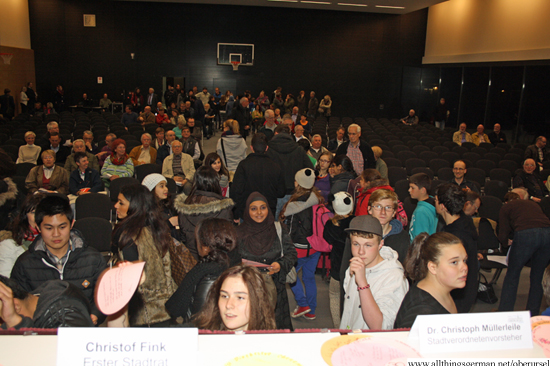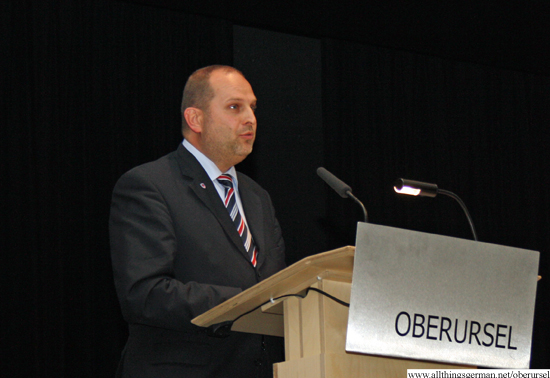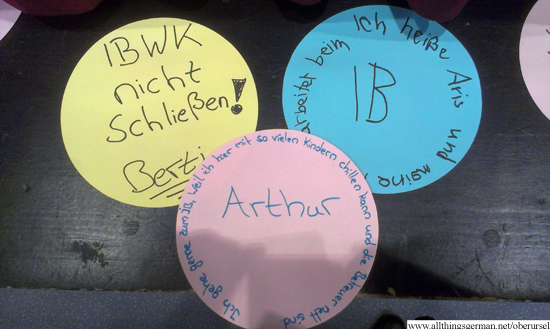It can’t be easy being in charge of Oberursel’s finances. After two rounds of spending cuts and tax increases, the town’s budget could budget could be in the black to the tune of around €4.5 million after a sudden windfall of corporate income tax (Gewerbesteuer) and further cuts in the culture department.
That is, it would be if the next higher level of government – the Kreis – had not increased the amount that the town has to pay for their services, including the school, by almost €11 million for the coming year, leaving with the town with a deficit in 2014 of just over €6 million.
So once again the town called a meeting of its residents to discuss the next round of savings, holding it this year in the Burgwiesenhalle in Bommersheim. The hall may not have been full – around 160 people turned up – but there were a significant number of children and teenagers present to protest against the planned cuts in funding for the “Jugendtreffs” in Weißkirchen and Stierstadt.

Children from Stierstadt and Weisskirchen bringing their cards to the stage
They made their way to the front of the hall before the meeting was even underway to place cards on which they had written their wishes onto the stage and were subsequently invited by council chairman Dr. Christoph Müllerleile to address the audience.
Many of them cited the fact that the Jugendtreffs are places that they go to when they need help, especially when they need someone to talk to. Others use the facilities to do their homework in the afternoon. There are also jobs at stake.
The town’s treasurer, Thosten Schorr, was pleased to see so many people turn up for the meeting and presented a range of figures from the town’s finances over the past few years, repeating the fact that one of the main problems is that the town has to balance its books by 2016 and not, as previously had been thought, by 2020.
He was also ready to stop any misconceptions about the budget before they even started, pointing out that it is not the personnel costs that are the largest item of expenditure in the town as some may think. It is, in fact that payment to the Kreis which takes over 50% of the town’s income.
The second largest position is “children, youth and family” at €18 million per year, followed by transport including the U-Bahn, internal administration, and then security, law and order.
Which is not to say that the personnel costs are not part of the discussion, it is just that increase here is in part down to the new requirements for under 3 child care places.

Treasurer (Stadtkaemmerer) Thorsten Schorr
But after two rounds of savings, the new ones will hurt. Not only are the Jugendtreffs to lose their funding, one of the sport events in the town – the Altstadt Duathlon – will be in a similar position.
The rules on who can use the Stadthalle at subsidised rates have already been changed, and from 2016 these rules will also affect the Burgwiesenhalle, Taunushalle and Ferdinand-Balzer-Haus, meaning that some organisations will either have to pay more, charge an entry fee, or go elsewhere.
The restaurant in the Stadthalle is to close next year, saving the town the money it spends on subsidising it along with the wages of the 12 employees, but at the same time created a new problem for those events in the hall with catering requirements. “It cannot be the town’s obligation to keep a catering business running”, Thorsten Schorr commented. He said that the decision had been taken so far in advance to allow the employees time to find new jobs.
The land owners tax is set to rise from 300 percentage points to 450 next year and up to 625 in 2016, something that will affect almost everyone in the town ans many landlords pass it on through the Nebenkosten to their tenants.
In fact, it was his most dramatic moment that earned Thorsten Schorr the most applause, when he tried to point out the fact that closing the Stadthalle completely along with the library and the U-Bahn line would not be enough to balance the books, and commented that to make sufficient savings “we shouldn’t have built the new swimming pool“.
But, as it was later pointed out, you cannot please all of the people all of the time, and if the town kept the Jugendtreffs open and stop the U-Bahn or had not built that swimming pool, then there would be an outcry for those too – just from a different group of people.
In the discussion that followed, many questions were asked and received answers, such as why the town uses external resources, why the Jugendtreffs have to close, what will happen to facilities for senior citizens, and why some parts of the library cannot be operated by volunteers.

Some of the cards that the children had placed on the stage
But at the end of the evening, it was only those youth centres that stand a chance of having their fate re-considered. Their protest may well have made an impression on the councillors who will continue to debate the situation in the forthcoming meetings of the finance sub-committee, before the town council takes the final decision on 21st November.





Speak Your Mind